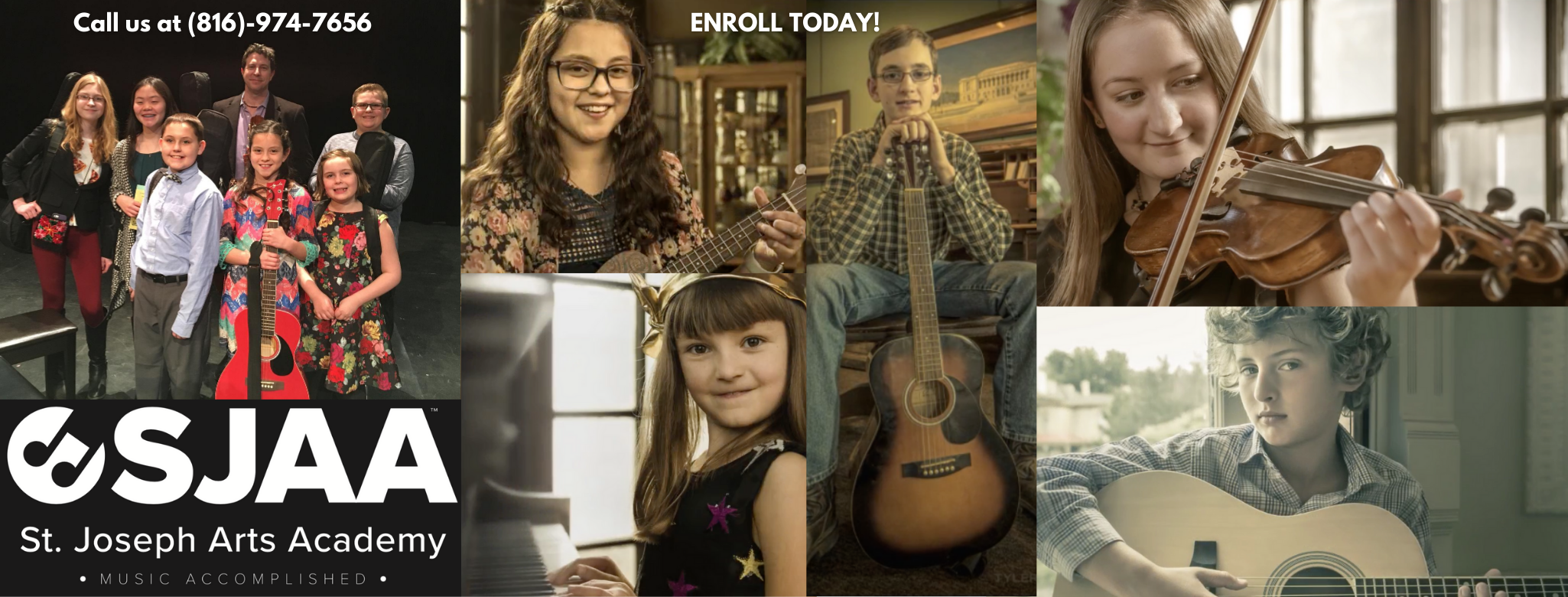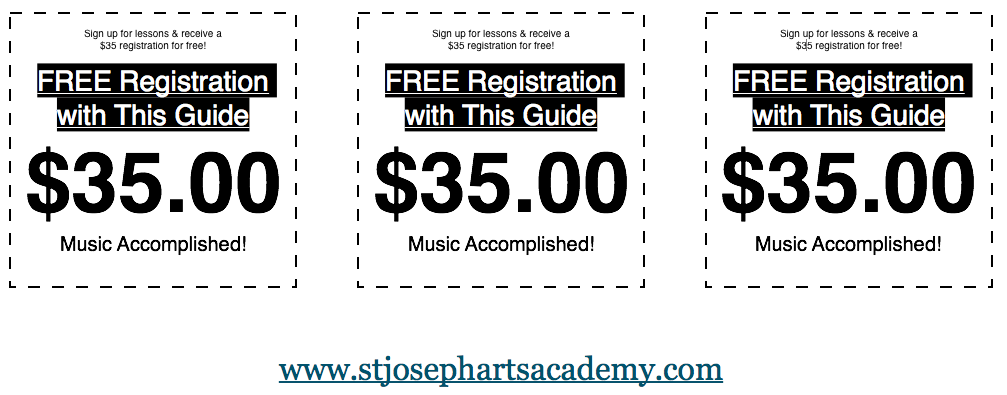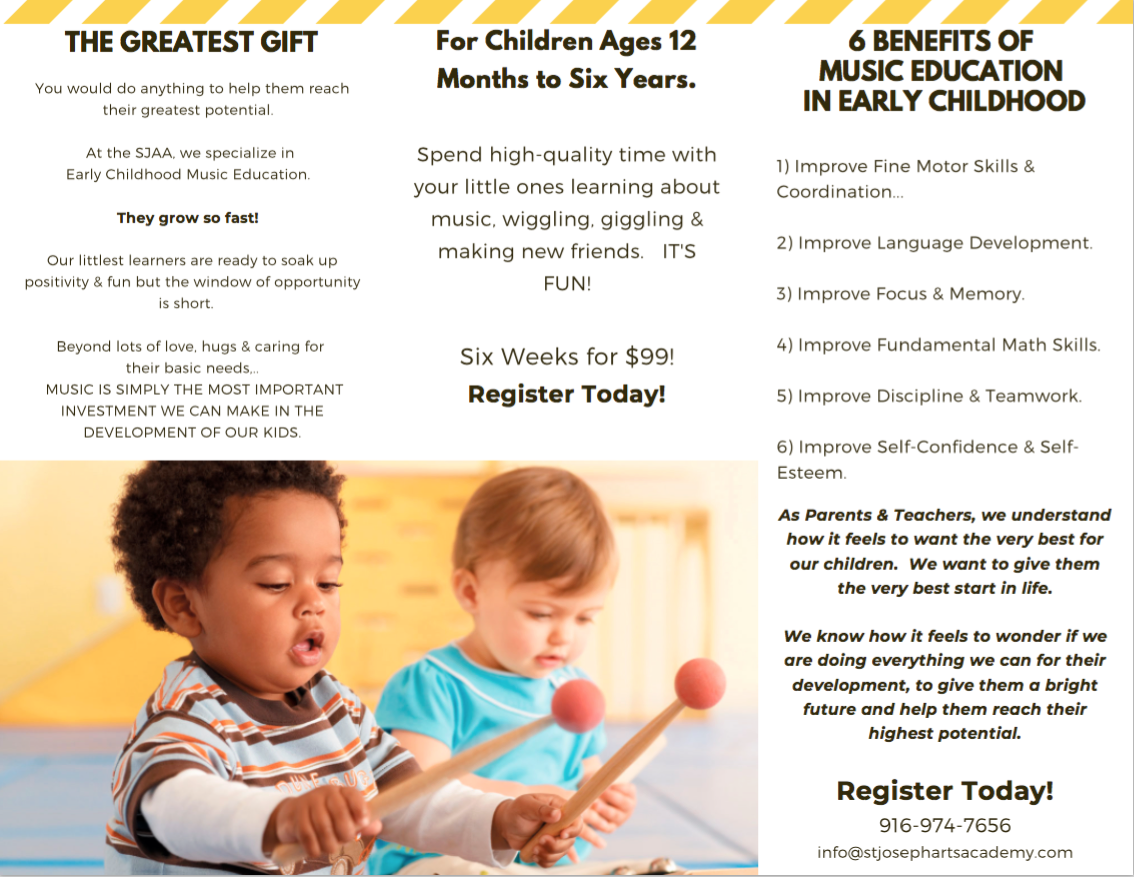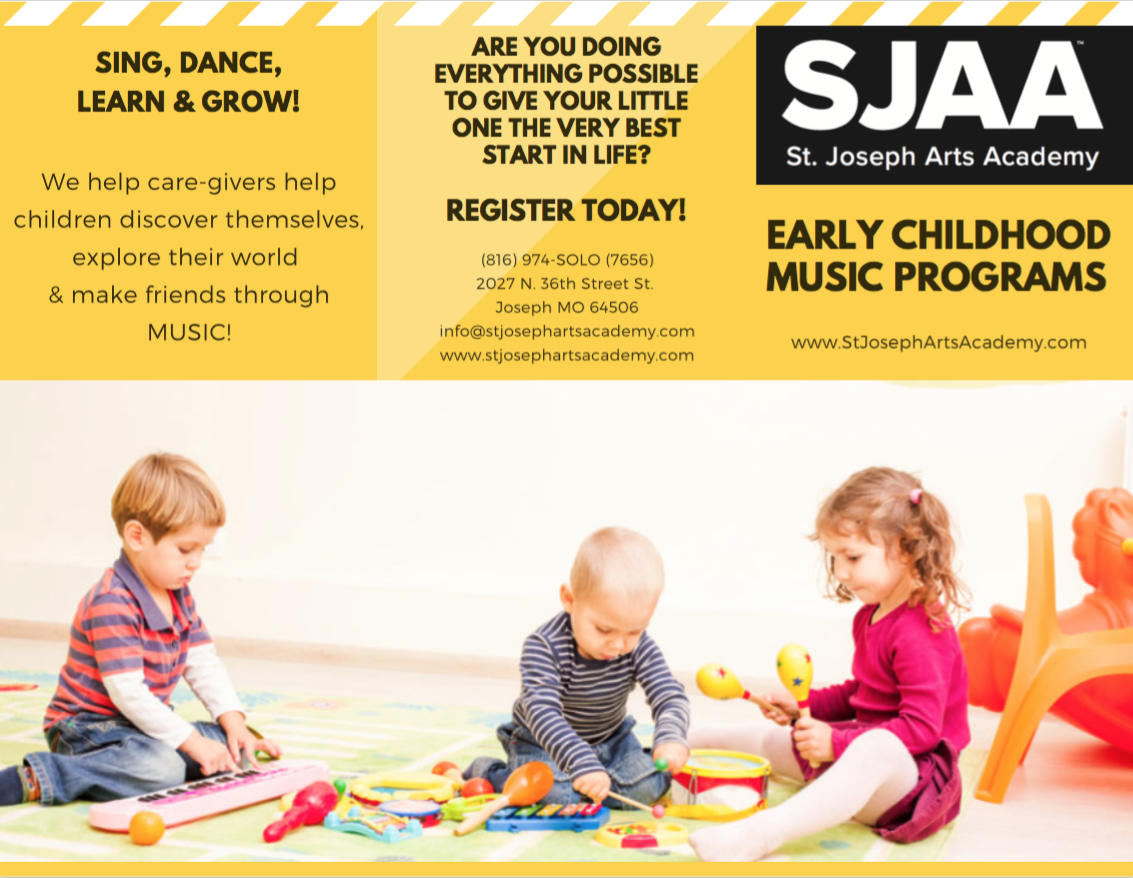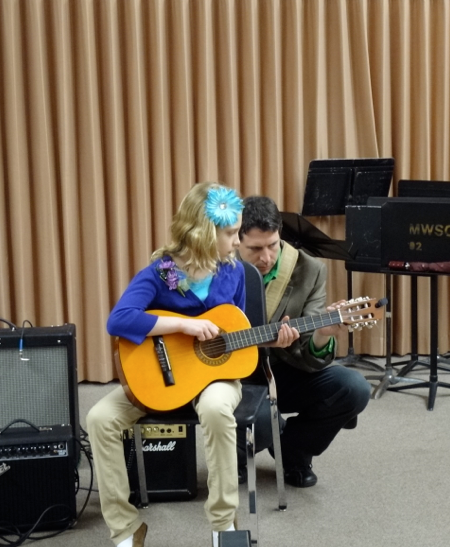http://www.jasonriley.com
https://stjosephartsacademy.com
http://www.socajukebox.com
Category: Violin Lessons
Early Childhood Music Classes
SJAA MUSIC Classes
Early Childhood Classes ages 1-3 called “Early Music Academy”
6 weeks for $99, 30-45 minutes, 4-8 students AND parents (6 during COVID)
Goals: participate, “singing” voice, gross motor actions mimicked, react to music through movement, learn high/low, learn fast/slow, learn music abcs, craft (playdough/drawing)
DESCRIPTION: Does your young one bounce and sway when they hear music? Do they “sing” for you? This class introduces music in a fun and active way to increase exposure in young children in an interactive format with their parents jumping in on the fun! Sessions do not repeat content and can be taken for consecutive sessions.
Session 1: SATURDAYS 11am Emily
Questions to ask: Can your child sit unassisted? Can your child hold objects confidently? Does your child “sing” along with music? Does your child struggle with separation anxiety? Has your child been in a class setting before? (this would determine if a 3 is ready for next level)
Tools to use: scarves, jingle bells, egg shakers, rhythm sticks
-Opening Song: Hello Song (can you clap your hands/stop your feet/turn around/all sit down)
-Ending Song: Goodnight *name* from Music Man “We’ll see you here next time/We hope you come again”
Classes will be themed for each week.
Toddler Music Classes called “Music Fun Academy” ages 2-4
6 weeks for $99, 45-50minutes, 4-10 students AND parents (6 during COVID)
Goals: pitch match within medium range some notes, repeat back 4-8 beats of rhythm correctly, gross motor holding instruments and making a beat, fine motor actions mimicked, can start to sing along; know high/low, fast/slow, music ABCs
DESCRIPTION: Has your child had experience in other classes and now they want to explore music? This class incorporates different elements of music to build a solid foundation for lifelong appreciation and learning of music. Parents can watch or participate depending on each child’s ability. Sessions do not repeat content and can be taken for consecutive sessions.
2: MONDAYS 10am Erin
2: TUES 6:00pm Erin
Holiday classes ($20) 10am will include sleigh bells, Christmas and Hanukkah songs and books
ALL Classes: Welcome Song, chat, Movement Song (free movement/freeze dance/march), Action Song/Fingerplay, Book, Instrument play Song/Exploration, Education Song, Beats/Rhythms, Repeat Song, Closing Song & CRAFT
Each Session: 3 Movement Songs, 3 Action Songs, 3 song books, 1 composer book, 2 instrument books, 1-2 weeks exploring world instruments, occasional make and take an instrument home, stick work for beats, 2 education songs, 3 repeat songs
Tools to use: Scarves, rhythm sticks, shaker eggs, jingle bells/tambourine, maracas, sandpaper blocks
PRE-School aged Classes called “Super Music Academy” ages 4-5
6 weeks for $99, 45-50minutes, 4-10 students and parents (6 during COVID)
Prerequisite of Music Fun
Goals: can memorize whole songs and rhythm, pitch matches most notes, can make a steady beat
2: TUES 7:00pm Erin *these could be super art*
3: TUES 7:00pm Erin
Music class rotations for school year: SIX Sessions total
ALL Classes: Welcome Song, chat, Movement Song (free movement/freeze dance/march), Action Song/Fingerplay, Book, Instrument play Song/Exploration, Education Song, Beats/Rhythms, Repeat Song, Closing Song & CRAFT.
Each Session: 3 Movement Songs, 3 Action Songs, 3 song books, 1 composer book, 2 instrument books, 1-2 weeks exploring world instruments, make and take an instrument home, stick work for beats, 2 education songs, 3 repeat songs
Tools to use: Scarves, beat sticks, shaker eggs, jingle bells/tambourine, maracas, sandpaper blocks
Offering quality piano, acoustic guitar, electric guitar, voice, bass, drums, violin, cello, mandolin, banjo, ukulele, early childhood music lessons and art classes in St. Joseph, MO.
St Joseph Arts Academy • (816) 974-7656
Now Hiring GREAT Teachers! Request info here.
https://stjosephartsacademy.com
http://www.jasonriley.com
http://www.socajukebox.com
The Write Notes – July 2020
|
||||||||||||||||||||||||||||||||||||||||||||||||||
|
||||||||||||||||||||||||||||||||||||||||||||||||||
|
||||||||||||||||||||||||||||||||||||||||||||||||||
|
The Write Notes – April 2020
|
|||||||||||||||||||||||||||||||||||||||||||||||
|
|||||||||||||||||||||||||||||||||||||||||||||||
|
|||||||||||||||||||||||||||||||||||||||||||||||
|
The Write Notes – March 2020
|
|||||||||||||||||||||||||||||||||||||||||||||||
|
|||||||||||||||||||||||||||||||||||||||||||||||
|
|||||||||||||||||||||||||||||||||||||||||||||||
|
Great Gift Ideas for Music Students
Holiday Gifts for the Musician in your life.
Thank you for sharing the gift of music and for shopping “LOCAL” this holiday season. We’ll include some other links at the bottom of this page to our preferred local music retailers if you are looking for something more specifically.
Email jason@stjosephartsacademy.com for more information, orders, purchases and registrations.
SJAA is participating in the St. Joseph Chamber of Commerce “Shop St. Joe” program. Grand prize drawing is for $10,000 in mid-December. 1 ticket for every $10 spent.
At the SJAA, our focus is on growing advancing musicians.
We specialize in private music lessons in Guitar, Piano/Keyboarding, Voice & Singing, Violin, Cello, Ukulele and now, Drums and percussion! (Just $94 per Month for weekly 30 minute sessions with our expert instructors.)
We are also excited to offer Group Guitar and Early Childhood Classes in 2020. (pricing below)
While we are not a retail music store, we are fortunate to provide the accessories and books our students need at a discount. Members Only!
Holiday Gifts for the Musician in your life.
Gift Certificates
We offer them for private lessons ($94 per month) and for books and accessories ($25)
Diamond Head Concert Ukulele w/carrying bag
Just $69 (You Save 10.95)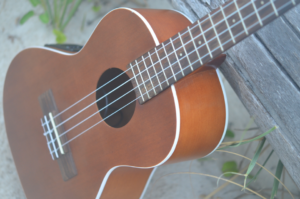
Music Method & Repertoire Books
(10% off In-stock or special orders in time for Christmas)

Hamilton “Fold-Up” Music Stand
Just $16 (You Save 8.99)
Only 8 left.
Guitarist Footstool
Just $10 (You Save 4.99)
Only 4 left.

Snark Clip-On Tuners
Just $10 (29.99 on Amazon!!!)
Only 6 left.

D’Addario 20′ Instrument Cable
Just $16 (You Save 4.68)
Only 2 left
Premium “Guitar”Care System
Just $20 (You Save 9.99)
Only 1 left
Pack of Guitar Picks
Just $3 (You Save 1)
Only 1 left
Mini Hohner Harmonica
Just $3 (You Save 1)
Only 3 left
Alvarez Access Pack (Guitar Tuner, Capo, Cloth)
Just $15 (List Price $40!!)
Only 2 left
Guitar Strings (acoustic or electric)
Just $10 ($20 installed)
Hohner “Chicago Blues”Harmonicas
Just $10 (45.04 at Kohl’s!!!)
Only 2 left
Yamaha Recorders
Just $6 (You Save 3.99)
Only 2 left
One-of-a-Kind Musical Tote Bags
Just $22
Only 6 left
“Music Accomplished” T-shirts
Just $20 adult & $15 children’s
In-stock or special order for size in time for Christmas
Black or Texas Orange
“Music Accomplished” Baseball Cap
Just $15
One size fits all in Black
“pBuzz” Kid’s Musical Instrument
Just $19 (You Save 10.99!)
Only 2 left
Group Guitar Class (beginners only, child or adult classes)
6 – 1 hour weekly “Intro to Guitar” group classes. Includes FREE materials (guitar not included).
Beginning Mid-January, 2020. Days and Times TBA.
Just $99!
Limited space available. Early Childhood Music Classes
Early Childhood Music Classes
The very best gift we can give our little ones in their most important, formative years!
Sing, Dance, Explore Instruments, Have Fun and Make Friends in these Weekly 50 minute sessions for “mini-mozart’s” and parents, grandparents or caregivers.
Age specific classes for 8 months-5 years.
Beginning Mid-January, 2020. Days and Times TBA.
Just $195 per Quarter! (Sessions begin every 3 months)
Limited space available.
Group Guitar Class & Guitar Package (beginner’s only, child or adult classes)
6 – 1 hour weekly “Intro to Guitar” group classes. GUITAR INCLUDED! (choose acoustic or electric package) Includes FREE materials.
Limited class spaces available.
Beginning Mid-January, 2020. Days and Times TBA.
Just $247 (student acoustic guitar package) or $297 (student electric guitar package)!
Acoustic Guitar Package (Concert Acoustic guitar w/carrying bag, picks and tuner)
Just $297!
Electric Guitar Package (Concert Electric guitar w/carrying bag, amplifier, cable, picks and tuner)
Just $397!
30 Day Guitar Challenge
The SJAA “30 Day Guitar Challenge” is a great way to kick of the new year with daily, positive and motivational messaging, instructions and short video lessons delivered to your inbox.
For players of all levels ready to make a commitment to up their guitar game. This inspirational 30 day “Bootcamp” will cover topics from tricks, tools and techniques for playing and practicing to musical interpretation, history and mindsets for musical success. A fantastic and fun supplement for any guitarist already taking lessons. Start off on the right track in 2020. Join us for the 30 Day Guitar Challenge beginning in January.
Just $30
To Register:
www.StJosephArtsAcademy.Com/30DayGuitarChallenge
Challenge is limited to 40 guitarist.Registration ends December 24, 2020.
Heirloom Photos from Tyler Osborn Studios
Gifts for YOUR Family!
TYLER OSBORN Studios
e: tylerosbornstudios@gmail.com
a: 9700 Walnut St., Kansas City MO 64114
c: (913) 226-6529
ig/fb: @tylerosbornstudios
w: tylerosborn.myportfolio.com
CD Packages – Soca Jukebox, Under the Big Oak Tree, Jason Riley & Maria the Mexican
Mix and Match 3 CD’s for just $20!
Check out our past blog post for more info on great gift ideas for your guitarist.
Gifts for your Guitarist
Email jason@stjosephartsacademy.com for more information, orders, purchases and registrations.
We have some great recommendations if you are looking for keyboards, high-end instruments or other instrumental accessories. Just ask.
Happy Shopping and Happy Holidays!
St. Joseph Arts Academy
Preferred Local Music Retailers…
St. Joseph, MO
https://www.lanhammusic.com (See our friend, Aaron)
Parkville, MO
https://www.bentleyguitars.com (See our friend, Mark)
Atchison, KS
https://muddyriverguitars.com (See our friend, Scott)
http://www.jasonriley.com
https://stjosephartsacademy.com
http://www.socajukebox.com
Music Students
How to Practice
How to Practice
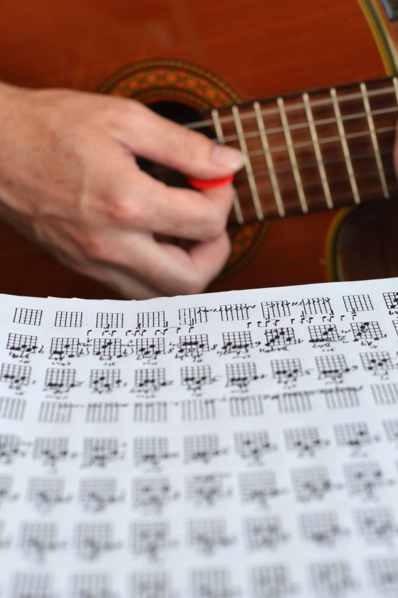
One definition of practice is… “a repeated exercise or performance of an activity or skill so as to acquire or maintain proficiency in it” As in it must have taken a lot of PRACTICE to be such a good guitar player.
Doctors and lawyers are said to have a practice when carrying out the exercises and duties of their profession. I don’t really want my doctor to be PRACTICING on me as he’s cutting me open. I want him to PERFORM the perfect operation.
Practice can also be customary, habitual or expected procedures for something. This could be like a meditation practice or yoga.
As musicians, we really embody each of these definitions of practice in slightly different mindsets. The exercise needed to perform a technically challenging passage or even to get our muscle-memory together enough to play a basic chord and then chord progression. Music is also our field of study as in medicine or law, it IS our practice. Hopefully it is also a thing that we’ve made a part of our day to day programming that happens habitually. We don’t necessarily call it practice but I hope you’re planning to eat, sleep and brush your teeth today.
So what are things we should do to become a person of practice and what does it mean to practice well? What does effective practice look like? When are we done practicing?
It actually took me many years to discover and refine my techniques for effective practicing. I’ve tried a number of approaches that I may touch on here. My way doesn’t have to be your way. You should definitely explore what best practices are for yourself.
At its most basic, practice time set aside to do your best. There can be many things that can distract us from the task at hand or take our mind away from our most challenging work.
Perhaps you’ve had the experience of sitting down to practice a new piece and after a few minutes you’re noodling away on favorite licks, riffs or another piece entirely (usually all things you already play pretty well). You might even become so mesmerized in this that you actually lose track of time, not realizing that you’ve been just “playing” with your instrument for 20 minutes. Weren’t you supposed to be “practicing”? It’s ok to make some time just to noodle, jam or play for fun. Set your timer though and get back to work after that time is spent.
To be truly successful in your practicing you need to have a purpose or goal and be on a time schedule. We all have the feeling that we want to become “a better guitarist” but that is not what I mean by purpose. The purpose of your practice should be topical (learn a new scale fingering, accompaniment style or arrangement) and should be scheduled for a certain amount of time.
My personal practice usually involves a few topics. These are places in my playing where I’m trying to “grow”. I use many of these same areas and methods with all my students no matter the age or level of achievement. Topics include things like technique, scale and chord vocabulary, sight reading, pieces/songs/tunes, ear-training and memorization. There are many more I have included over the years again depending on what my purpose was at the time or where I felt I had some weaknesses. Theory, performance practices, history, improvisation and just time to listen to music are all things I’ve put time into. I want to grow in all these areas in deeper ways.
So let’s make some time to practice. Put it in your schedule. Write it on the calendar. A little time everyday. The famous japanese music mentor Shinichi Suzuki said you should only practice the “days you sleep and the days you eat”! I think that’s great advice. We all will miss a day now and again and that’s understood. You may want to set your weekly practice schedule up to include a “skip day”. That’s an important “practice” in some religious circles. Also, it can be a nice reward especially for younger students who really work hard all week.
The amount of time each day is not as important to me as just the “every day”. If you practice with a purpose everyday you will get better. A lot has been said in the past few years that it takes a FOCUSED 10,000 hours to become a master at anything. Free-throws, heart surgery, flower arranging, etc. You’ll be come the “master” faster by practicing 3 hours everyday as opposed to 10 minutes obviously. Mastery is the fruit of purposeful practice. No need to worry about the fruit. It will come at the right time and in the right season. Your practice is in taking care of the tree. Prune it and water it with the time you have today and schedule it again tomorrow. Do that and you’re doing the best you can.
10 hours a day for 3 years = Your the master!
3 hours a day for 10 years = Your the master!
1 hours a day for 30 years = Your the master!
I will say that in my experience it takes at least 20 minutes of practice just to kind of stay at the place you left off yesterday. If you don’t use it (and use it again) you’ll lose it.
I use the timer in my practice (and a tuner, a metronome, books and music, a music stand, and a pencil but the timer is VERY important). It keeps you on task. If you are playing a game like basketball, that game is timed. You have a certain amount of time to play with a purpose of making points for your team, defending against the opposing team and doing your very best. Then there’s a buzzer that signals the end of play, maybe the 1/2, the 1/4 or the end of the game. The point here is that you did your very best, you kept your head in the game and now it’s over.
My music practice is very much like that. I start the time and work on an alotted task for a certain amount of time. This is usually very short, between 2-20 minutes per task. This has two benefits. One, I know that I have to do my best for a very short time. Not hammering away for hours, just minutes. Two, if I do get distracted or get off task and do some mindless noodling, it reminds me to come back to the project and work until the buzzer goes off. With my students, I even give them pretend “points” for perfect repetition of the material. One perfectly played scale = 10 points or 100 or whatever. They may have only 3 minutes to make as many points as possible. It’s a little mind game but it works really well, gets them to do their best and make as many perfect reps as the time allows.
Again, there are number of important topics that go into building musical proficiency. You might just pick a few each day to devote your time to. When that buzzer goes off or time is up, move on to the next topic and start the timer again. Depending on the amount of time you’ve set aside for practice, you could do more or less. Remember, less in more in many instances.
As an example, If we had an hour to practice, I would start with a slow warm-up for maybe 10 minutes. We could move on to scales for 10, Chords for 10, sight reading for 10 and maybe one piece we’re working on for 10 minutes. It wouldn’t have to be the entire piece, lots of times its just a few measures or specific trouble areas. Then you could take a little break. Lots of performing musicians take set breaks too!
If that was all the time you had for the day, you could be done and go on with your life. If you had additional time (perhaps another hour) I would start with that routine again and repeat it. If you have less time maybe on a very busy day, you could get a 10 minute practice in on just two or three really important ideas at 3-5 minutes each. Hey, we can all find 10 minutes even on a busy day, right? The important thing is that you’re FOCUSED, you’re doing it on purpose and you’re proving to yourself that you’re disciplined, dedicated and committed to your advancing musicianship.
If you’re making a lot of mistakes while practicing, you are probably going too fast or trying to practice too much. This is a common problem and it does take a lot of discipline to slow down and work on very small or short musical problems.
Truly effective practice is practice with a purpose. That purpose is different for everyone and adjusted to the topic you’re working on. You might have a goal to play a C major scale in 1/8th notes at 160bpm. You might want to learn a new jazz standard every week. You may need work on that one measure that always messes you up in that Bach prelude. Your purpose is to fix, add or increase in your abilities as they apply to your goals in music.
Here’s a few other ideas about what practice is and what it can do for you.
Practice is…
Motivational – The more you do it, the more you want to.
How we learn – Things seep in over time through repetition. We learn by doing.
Transformative – Makes things better through attention and intention.
Reducing Imperfection – Unlearning bad habits or replacing them with good habits.
The way to Carnegie Hall – “How do you get to Carnegie Hall? Practice.”
Infectious – A little can lead to a lot.
Love – It demonstrates your affection for what you are practicing.
To Overcome – Limitations and small expectations.
Making Mastery – 10,000 hours (Give or Take).
Confidence building – When you’ve put in the time to know what you’re doing and you know it.
Non-judgmental? – Do it when you feel good or bad. When it’s time to fight, you have to do it no matter what mood you’re in.
Persistence – No matter what happens, slow down, re-focus and just keep plowing ahead.
What you become – Like the doctor or lawyer, you are what you practice most.
Life Enhancing – Just do it, you’ll be glad you did.
A Teacher – It encourages us on the path of discovery. It shows you what it is and what it might become.
Truth – It’s where you find out what’s real for you. Where you are on the path.
Application – Using what you know, at the right time, when you need it.
For Champions and Masters – They all did it. I promise.
Not Easy – It feels like work sometimes, ok it is actually work.
Acceptance – Forgive yourself for not being automatically perfect. You’re getting closer.
Purposeful – Practice with a purpose in mind. Practice because you’ve got to. it’s the only way.
Cultivating – The tree that your fruit comes from.
An Inner Game – The only competition is within. The only real competition is in the mirror.
Tomorrow’s Victory – “Tomorrow’s victory is today’s practice – Chris Bradford, The Way of the Warrior.
Development – The garden grows best when it’s weeded and tended to. True in all things like love, forgiveness, patience and giving.
Preparation – To being and doing what you want to be and do.
Practice is… THE WAY.
Practice Makes Perfect?
Practice Makes Permanent
Practice Makes Possible
Practice Makes Possibilities
Practice Makes Patience
Practice Makes Partnerships
Practice Makes Playing Possible
Practice Makes Pathways
Practice Makes Progress
Practice Makes Proficient
Practice Makes Professional
Practice Makes Proof
Practice Makes Practical
Practice Makes Precedence
Practice Makes Prepared
Practice Makes Purpose
Practice Makes Perception
Practice Makes Performers
Summary – Whatever you can imagine or aspire to do, you can do that in music (or anything almost) through focused practice over time. I aspired to play music. I’ve never really felt that I had any great or natural talent to do so. Everything that I’ve accomplished in music and on my instrument has just been through hard work, smart work, time and persistence. In short, practice.
While I may never be a ballet dancer or professional football player because of my physical build (not that I’m inspired to become one). Through practice and study, I could learn the techniques, I could get better, I would grow.
It’s truly amazing what human beings can accomplish given enough time.
Special Offer – If you found this article helpful, please consider subscribing, drop us a note or consider joining us on the path to mastery. The St. Joseph Arts Academy is a resource for all things musical. We are here to support and encourage you along your musical path. Now…
GO PRACTICE!
http://www.jasonriley.com
https://stjosephartsacademy.com
http://www.socajukebox.com
How Can I Stick with Learning a New Instrument?
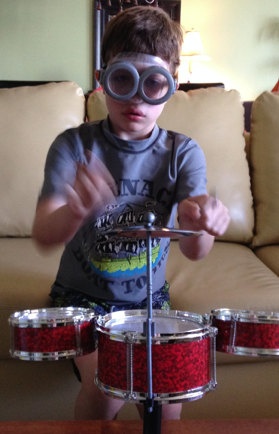 Hey, let’s face facts. Learning a musical instrument is fun and rewarding but it’s also kind of tough.
Hey, let’s face facts. Learning a musical instrument is fun and rewarding but it’s also kind of tough.
If it were easy, everyone would play an instrument.
Unfortunately, we know that it’s kind of a rare skill amongst the population at large.
Personally, I think everyone should learn to play something. And they can! The key is to understand that simple doesn’t always mean easy. That anything worth doing requires effort, energy and attention. To know that you might not always feel like practicing. You might feel bored or frustrated sometimes. But you know you are going to do it anyway.
There are certain things we all do. We like to eat. We like to sleep.
Hey, we are human and we do those things everyday because we need to. Well, now we are talking about musicians. Guess what they do everyday?
Musicians play music and practice it. That’s just who we are and part of what we do.
Everyday.
The days we sleep and the days we eat.
For beginners, it is often tough to accept that it takes a lot of time and effort to become the accomplished musician they dream of, but with the following tips, you’ll find it easy to stay dedicated in your music lessons.
Choose your instrument wisely.
When you’re first considering music lessons, follow your natural inclination toward a specific instrument. Also, it is worth taking a wander around your local music shop. Not only does this give you the chance to hold the instrument, but you can get demonstrations of every variety until you find something that’s right for you. If you don’t find yourself immediately attached to anything, you can always rent instruments – or try one that everyone has access to… with some singing lessons!
Learn music you like.
It’s all well and good to aspire to play the great classics that every professional has in their repertoire, but when starting off, it is worth picking some pieces of music that mean something to you. If you ask your teacher to help you tackle a piece you feel a connection with, you’re far more likely to want to carry on learning and attempting to play.
Learn with others.
Even though many of us opt for private music lessons with the hope of learning faster with more one-on-one time, it can actually be beneficial to learn with a friend or a family member. This works especially well if you’re trying to encourage a child as young children love to be involved in what their parents are doing. Group classes are a great way to get started and make some like-minded friends. Especially important for the socialization of our littlest learners.
Music is NOT rudiments and scales?
Traditional music teachers will often begin by teaching scales, chords and other basics but these can get extremely tiresome after a few lessons. Find a teacher that will start by teaching you based on YOUR musical goals and it might just keep you interested for when more structured rules and theories need to be learned.

Don’t be afraid to jam.
Even the most rehearsed and experienced musicians need some moments of letting go. This is something you can easily achieve with a jamming session. Whether you’ve learned just one song or you have a whole repertoire, spontaneity not only encourages creativity, but it might open up your eyes to things you never knew you could play. Finally, jamming might reveal to you what you want to focus on in your lessons, which makes it easier to stay dedicated and work toward your goals.

